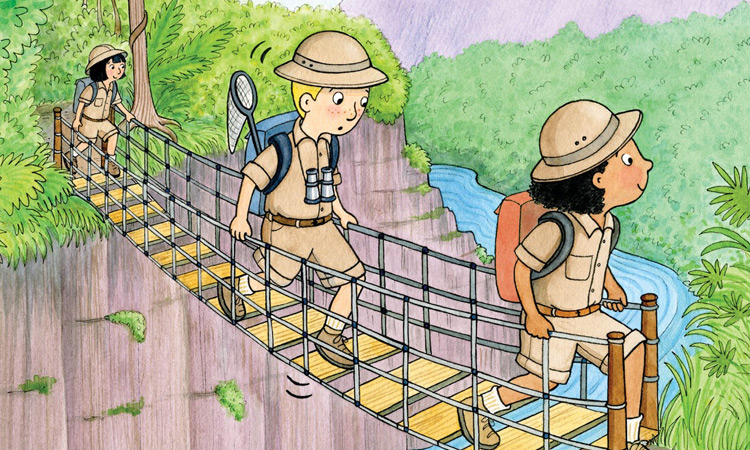 Remember all those times in grade school when you had to—gulp—get up to recite a line in the school play, or when it was up to you to hit the pitch that could either make or break the softball team’s winning streak? What if you made a mistake? Oh, the horror! It was enough to make you quake.
Remember all those times in grade school when you had to—gulp—get up to recite a line in the school play, or when it was up to you to hit the pitch that could either make or break the softball team’s winning streak? What if you made a mistake? Oh, the horror! It was enough to make you quake.
What to Do When Mistakes Make You Quake: A Kid’s Guide to Accepting Imperfection, written by clinical psychologists Claire A B Freeland and Jacqueline B Toner, and published by Magination Press, an imprint of the American Psychological Association, aims to put the brakes on the fears that make kids quake.
This interactive self-help book is geared toward helping kids age 6 to 12 discover the emotions underlying their fear of making mistakes. What to Do When Mistakes Make You Quake features exploratory activities that kids can do together with parents, and provides practical strategies—based on the cognitive-behavioral principle that thoughts, emotions and behavior are interconnected—to help kids learn how to tolerate mistakes and gain knowledge and confidence from fearful experiences.
Goofs and strike-outs
“A kid may forgo an activity for fear of not excelling. Or, a student may fail to complete assignments on time due to erasing too much, rewriting or overdoing the task in some way,” Freeland and Toner say. “Kids who worry about being wrong or making mistakes may try to control situations to ensure their success, blame others for their failings, see themselves in a negative light or be critical in general. They may have trouble making decisions for fear of making the wrong ones. It’s exhausting trying to avoid mistakes—for you and your child.”
So what’s a parent or caregiver to do when kids goof and strike-out? Freeland and Toner suggest before delving into the book, that you first talk about your own hypercritical feelings growing up and how you coped with your mistake-making quakes, followed by reading one or two chapters of the book at a time to help kids gradually learn how thoughts affect emotions.
Challenging unhelpful thoughts
“I missed the goal. I’m a terrible athlete.” What kids think, Freeland and Toner stress, affects how they feel. Kids, though, can benefit by replacing their unhelpful thoughts with challenge thoughts: “I missed the goal. That was a tough shot.”
Unhelpful thoughts come in many forms. Catastrophic thinking, likened to snowballs rolling down a hill, can turn small worries into seemingly big disasters: “Hannah loves horseback riding.…Her teacher keeps inviting her to come to horse shows and compete with other riders her own age, but Hannah always says, ‘no.’ She just knows she won’t win and she’s sure she’ll come in last and feel foolish.”
What could Hannah do?
- Ask other kids who’ve gone to riding shows about their experiences
- Ask her teacher what she would be asked to do at a show
- Go to watch a show and see what they are like and how well other kids in her age group ride
Also, “When you feel afraid to try something new it can be helpful to think carefully about what exactly might happen if it went badly,” Freeland and Toner say. “You may find that when you really think about it, the worst thing that could happen isn’t a very likely thing.”
Another form of unhelpful thoughts is black-and-white thinking—something is either all bad or all good with nothing in-between; this “can lead to thinking about mistakes and failures as signs that a person isn’t ever going to succeed.” Freeland and Toner recommend kids consider whether the problem might be something that can change, i.e., “I’m no good at drawing” can take a positive spin in, “learning to draw well takes a lot of practice.”
Facing failure
“Sometimes you have to accept failure. To accept, in this context, isn’t saying to yourself, ‘Oh well, I don’t care.’ It’s saying to yourself, ‘This is hard and uncomfortable, but I can handle it.”
When success doesn’t smile on kids, they can learn to turn a negative into a positive, by learning how to let go and gain perspective on the situation, and focus instead on what they might do in the future.
Takeaway tools for a lifetime
Getting kids started early in recognizing their emotions and how to deal with making mistakes can reap a goldmine of lifetime benefits. Freeland and Toner stress to kids that, “You will get better and better at catching those unhelpful thoughts and challenging them. And the more you accept that being wrong, messing up and striking out are parts of everyone’s experiences, the more you’ll get used to living with your mistakes…The new discoveries you’ve made reading this book are not just for kids. You’ll be able to use them for the rest of your life.”
Click here to see Rose’s tips for healthy and happy relationships

